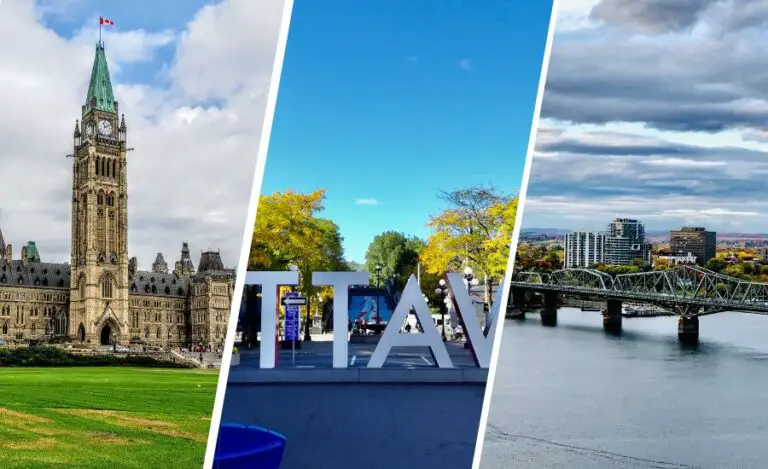What Is The Cost Of Living As A Student In Toronto?
Living in Toronto as a student is whole different experience. The ease of travelling to different location without any hassle and all the shopping distance at a walking distance is something that a student always look for.
To talk about the cost of living, I have contacted one of my friend from Toronto to give you guys an exact number that he has spent for his expenses in 2023 and what you can expect to pay for food, rent, accommodation and many more.
Simply put, the cost of living in Toronto can be anywhere between $1300 to $2500 per month depending on many factors that I will be discussing further in this article. So, without any further a do, let’s dive in and clean all your doubts and myths about living in Toronto, Canada as an International Student.
You May Also Like:
- Is It Easy To Find Security Job In Canada?
- 10 Best Part-Time Job To Boost Income
- Can I Get Sales Job With No Degree And Experience?
- How To Get Part-Time Job In Retail Without Experience?
- 10 Ways To Find Jobs On Indeed
Toronto: An Overview
Toronto is the largest city in Canada and the provincial capital of Ontario situated on the northwestern shore of Lake Ontario. It also have one of the tallest freestanding structure, “The CN Tower” in the world and the Toronto island.
It is well known for its cultural diversity, vibrant arts scene, and economic opportunities. Toronto is a major global city and a hub for finance, business, technology, and entertainment. The total population according to Canada Population is 2.7 million as of 2022, making it populous city in Canada.
Also Read: 20 Pros And Cons Of Living In Ontario
Why Toronto Is A Popular Destination For Student?
Toronto is a highly popular destination for students due to several compelling reasons. Firstly, the city boasts a diverse and multicultural environment, offering students a vibrant and inclusive atmosphere to study and live in.
Secondly, Toronto is home to several prestigious universities and colleges renowned for their academic excellence. Institutions such as the University of Toronto, York University, and Ryerson University attract students from around the world seeking quality education and research opportunities.
Furthermore, Toronto offers numerous career opportunities and networking prospects. As Canada’s economic hub, the city is a thriving center for industries such as finance, technology, healthcare, media, and entertainment.
Students benefit from access to internships, co-op programs, and job opportunities within these sectors, setting a strong foundation for their professional growth.
1. Accommodation Expenses In Toronto

A. On-campus housing options
1. Cost of dormitories and shared apartments
Before moving to any house, basement or apartment, start looking for on-campus housing options such as dormitories and shared apartments. The cost of dormitories can vary depending on many factors such as room size and the location of the campus.
On the other hand, shared apartments (where you will be sharing with bedroom with another person) are more affordable if compared with dormitories.
The price of on-campus housing can cost anywhere between $1,500 to $1,800 per month and can go higher depending on the amenities you have chosen.
2. Availability of meal plans
College and Universities do offer a meal plans for their students residing on campus but this meal plan comes with a particular number of meals per semester.
For example, if you are studying in SFU, the university offers different meal plan that can cost you anywhere between $3,000 to $3,600 (or $750 to $800 per month) for the semester.
B. Off-campus housing options
1. Cost of Apartment And Basements
According to The Globe And Mail, Toronto offers a variety of price for basement and apartments that can start from $600 to $3,500 per month which depends on your needs, location and requirement.
A one-bedroom in a two-bedroom shared apartment can cost you anywhere between $1,400 to $1,700 but if you choose to live in a bedroom apartment then it will cost you $1,900 to $2,200 per month including amenities.
Additionally, I highly recommend you to consult with different people about the location and the price of the place if you are looking for a place for the very first time. They may charge you higher compared to other people living in the same house or apartment.
2. Additional Utilities
In addition to the rent, you must consider additional costs such as utilities and internet services. Utilities include electricity, heating, water, and sometimes garbage disposal. These costs can vary depending on the size of the accommodation and the season.
On average, utility costs for a one-bedroom apartment in Toronto can range from $50 to $150 per month. Talking about the latest updates about utilities and internet services, you can expect to pay around $90 to $120 per month for these expenses. I also written an articles on 7+ ways to get Unlimited Internet to solve your Internet issues.
Here is the exact Utilities & Internet Service Expenses In Toronto.
| Expense Type | Cost |
|---|---|
| Electricity | $35 – $40 |
| Internet | $60 |
| Water | $15 – $20 |
| Total | $90 – $120 |
2. Transportation Cost In Toronto

A. Public transportation
Toronto has a well-developed public transport system also known as Toronto Transit Commission, which includes buses and other vehicles for public transportation. The cost of bus passes and ticket in Toronto depends on the distance you are travelling and the type of fare.
Additionally, Toronto Transit Commission offers a various fare options, including single-use Presto Ticket, Presto Card and the monthly pass.
If you using TTC services on a regular basis, I will high recommend you using a bus pass that can cost you around $154 max per month. You can check the updated price of Toronto Transit Commission Service Here.
Further more there are many universities in Ontario that are registered in TTC program, which provide unlimited transit access (A.K.A Presto Card) at a significantly discounted rates for student.
B. Other transportation options
1. owning a car or using ride-sharing services
Owning a car in Toronto involves additional costs such as purchasing or leasing the vehicle, insurance, maintenance, fuel, and parking fees.
And as a local or international student, the cost of managing personal expenses and paying for a car monthly instalment, insurance can be challenging.
Here, you can use ride sharing services like Uber or Lyft for occasional transportation needs. The cost of these services may vary depending on the time, distance travelled and the location. For example, the cost of using Uber at peak hours (office hours) is much higher than using at any other time.
In case you are planning to own a car then you must understand the ways to save money on car expenses as well as saving money as an International student is for emergency situations.
2. Parking expenses on or off-campus
If students choose to own a car with a part-time job, they should consider parking expenses on or off-campus.
On-campus parking facilities may have designated parking areas for students, and the cost can range from $200 to $450 per semester. You can also check the On-campus parking offered by University of Toronto, York University, and Ryerson University to have a brief understand about the prices.
Off-campus parking rates in Toronto vary depending on the location and the parking provider. It is advisable to research and compare prices for long-term parking options. If you live near Greater Toronto Area, the estimated cost of parking in apartments is $120 to $150 per month which depends on the car you own.
3. Groceries Cost In Toronto
A. Average cost of groceries
The average cost of groceries in Toronto can vary depending on factors such as the type of store, brand preferences, and personal dietary choices. However, to provide a general estimate, let’s consider the prices of common grocery items.
Basic food staples like rice, pasta, and bread are typically affordable, with prices ranging from $1 to $3 per package. Fresh produce, such as fruits and vegetables, can vary in price depending on the season and availability, but on average, you can expect to spend around $1 to $3 per pound. Dairy products like milk, cheese, and yogurt usually range from $2 to $5 per item.
Meat and poultry prices can vary depending on the cut and quality. For example, boneless, skinless chicken breasts can range from $4 to $8 per pound, while ground beef may cost around $4 to $6 per pound. Canned goods, snacks, and beverages generally range from $1 to $5 per item.
It’s important to note that these are approximate prices and can vary depending on the specific grocery store and any ongoing promotions or discounts. Comparison shopping and utilizing loyalty programs or discount cards can help reduce grocery expenses.
B. Price range of dining out options
Toronto offers a variety of dining out options, including casual restaurants, fast food, and higher-end establishments. The prices can fluctuates depending on the type of cuisine, location, and overall dining experience.
Here is a general price range for dining out options in Toronto:
Fast Food: Fast food chains like McDonald’s, Subway, A & W, or Wendy’s offer affordable options, with combo meals ranging from $7 to $16.
Casual Restaurants: Mid-range restaurants and cafes in Toronto typically offer a variety of dishes at moderate prices. Main course prices can range from $15 to $30 per meal.
Higher-end Restaurants: Fine dining establishments or upscale restaurants may have higher prices, with main course prices ranging from $40 to $70 or more.
C. Comparison of prices with other cities
When comparing food and grocery expenses with other cities, it’s essential to consider factors such as regional cost of living and availability of local produce. While Toronto’s prices may differ slightly from other cities, it’s generally comparable to the average cost of living in Canada.
Major cities like Toronto or Vancouver may have slightly higher food and grocery expenses due to higher living costs. On the other hand, smaller towns or rural areas (like Missisuaga or Kitchener) may have lower prices, especially for fresh produce sourced locally.
Final Words
Toronto is a vibrant place to live and the environment is good for upscaling your knowledge and getting job experience. But as an International student, it is very crucial to take care of your cost of living from day one. This will help in building a good financial habit and help you in saving money and creating an efficient budget.
Finally, I hope you have gained an overall understanding about cost of living in Toronto and what you can expect as a resident of Toronto.





